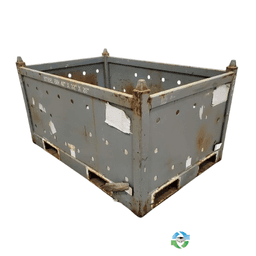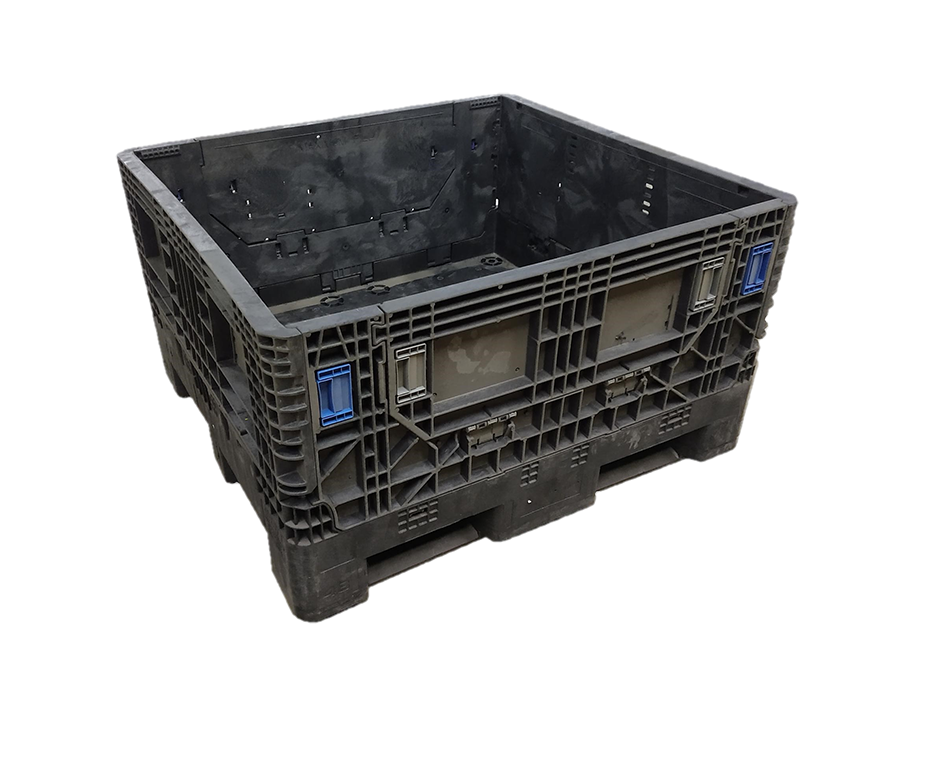The Ultimate Overview to Picking the Right Mass Containers for Your Organization Needs
Selecting the appropriate mass containers is essential for any company that relies upon reliable logistics. Numerous kinds of containers exist, each designed for particular products and applications. Variables such as dimension, product compatibility, and regulative criteria play a considerable function in this decision-making procedure. Recognizing these components can cause enhanced operational performance. Nonetheless, several organizations neglect necessary facets that could boost their total efficiency and sustainability. What are these factors to consider?
Understanding Various Kinds Of Mass Containers
Mass containers act as vital tools for companies looking for reliable storage and transport solutions. These containers are available in different types, each designed to fulfill specific operational needs. One common type is the intermediate mass container (IBC), which is perfect for fluid and granulated materials, providing an equilibrium of capacity and ability to move. Another prominent choice is the bulk bag, or FIBC, suitable for dry, flowable products. These flexible containers are lightweight and can be easily transported and stored. For heavier materials, rigid bulk containers are often used, supplying durability and security for risk-free handling. Furthermore, there are specialized containers customized for unsafe materials, making sure compliance with security regulations. Recognizing the unique features of these mass container types allows businesses to make enlightened decisions that enhance logistics and decrease costs. By selecting the right container, business can improve their functional performance and simplify their supply chain procedures.
Key Product Factors To Consider for Bulk Containers
When selecting mass containers, it is necessary to consider the materials made use of in their building. Factors such as toughness, chemical, and longevity compatibility play a vital duty in guaranteeing the containers fulfill particular functional requirements. In addition, weight and portability issues can impact both performance and transport logistics.
Product Durability and Toughness
Sturdiness and toughness are crucial consider choosing materials for bulk containers, as they straight influence the container's ability to hold up against different environmental problems and managing procedures. Products such as high-density polyethylene (HDPE), polypropylene, and stainless steel are commonly preferred for their durable properties, supplying resistance to abrasion, impact, and temperature level variations. The choice of product additionally affects the total life-span of the container; more powerful products generally result in less frequent substitutes, resulting in cost savings in time. Furthermore, the weight of the material can impact shipping prices and simplicity of handling. Companies should consider their particular operational environments and the potential for wear and tear to guarantee peak toughness and toughness in their mass container choice.
Chemical Compatibility Elements
Comprehending chemical compatibility is necessary for choosing bulk containers, as the products used should resist the particular compounds they will hold. Numerous aspects affect compatibility, including the chemical nature of the components, temperature, and duration of storage space. For circumstances, harsh chemicals might need containers made from stainless steel or specialized plastics that stand up to deterioration. Additionally, responsive materials can generate warmth or gases, necessitating aired vent or pressure-rated containers. The option of container material, whether polycarbonate, steel, or polyethylene, should straighten with the chemical residential or commercial properties of the saved substances to avoid violations or leakages. Ultimately, a complete examination of these compatibility elements assures safe handling and storage, protecting both workers and the atmosphere while keeping item honesty.
Weight and Transportability Worries
Choosing mass containers involves not just examining chemical compatibility but also thinking about weight and portability. Companies must evaluate the ease of handling and transportation to optimize performance. Light-weight products like high-density polyethylene (HDPE) or aluminum can assist in much easier motion and lower delivery expenses. Alternatively, larger containers may supply improved resilience however can prevent movement, especially in atmospheres needing constant moving. Furthermore, the design of the container ought to permit convenient training and piling, ensuring ergonomic safety and security for workers. Business should additionally take into consideration the infrastructure available for transport; as an example, containers compatible with forklifts or pallet jacks can enhance operations. Ultimately, the ideal equilibrium between weight and portability straight influences functional performance and price performance.
Sizing Your Mass Containers for Optimal Performance
When sizing bulk containers, organizations need to meticulously examine the dimensions needed to fit their certain items. Furthermore, weight capacity is an important variable that affects performance and safety throughout transport and storage. Effective sizing not only takes full advantage of room however likewise optimizes operational operations.
Establishing Container Capacities
Selecting the best dimensions for bulk containers is crucial for maximizing efficiency in storage space and transport. Businesses must evaluate their details demands, taking right into account elements such as offered area, the nature of the goods being stored, and the techniques of transport used. Accurate measurements guarantee that containers fit preferably in stockrooms and automobiles, lessening wasted space and minimizing managing time. Standard dimensions can offer convenience, however personalized measurements may be necessary for one-of-a-kind requirements or to suit particular items. Furthermore, it is very important to examine stacking capabilities and accessibility, as these variables influence overall functional performance. Ultimately, the right dimensions cause enhanced company and streamlined logistics, benefiting the overall performance of the organization.
Weight Capacity Considerations
Comprehending weight capability is important for organizations intending to enhance their mass container performance. The weight ability of a container directly impacts storage capabilities, transport logistics, and general functional costs. Picking containers with the appropriate weight limitations assures that organizations can securely store and carry their goods without risking damages or conformity issues. Straining containers can result in structural failures, while underutilizing capability outcomes in lost resources. When choosing containers, it is essential for businesses to examine their product weights and think about any kind of regulative needs. In addition, aspects such as the kind of material, meant usage, and environmental problems must also affect weight capability decisions. By examining these elements, companies can improve effectiveness and assure a streamlined supply chain.
Regulative Compliance and Safety And Security Specifications

Governing conformity and security criteria play an important function in the choice of mass containers for services. Organizations must assure that their containers meet various regulations set by regional, nationwide, and global authorities. These criteria often concern product safety and security, architectural honesty, and correct labeling, which aid prevent mishaps and guarantee the risk-free transportation of items.
Additionally, adherence to industry-specific guidelines, such as those from the Food and Drug Management (FDA) or the Occupational Security and Health Management (OSHA), is crucial for business managing dangerous materials or foodstuff. Non-compliance can cause penalties, lawful concerns, or damages to a service's credibility.
Businesses ought to also consider the container's compatibility with the products being saved or transferred to avoid contamination or chain reaction (used bulk containers). To sum up, recognizing and implementing governing compliance and safety criteria is important for the efficient and accountable usage of mass containers
Sustainability Alternatives for Eco-Friendly Bulk Containers

Business are additionally exploring options made from recycled products, which not just conserve sources but likewise sustain the reusing sector. Advancements in layout enable for lighter containers that call for less energy to transport, further improving sustainability. By incorporating these green bulk container alternatives, organizations can demonstrate their commitment to environmental stewardship while fulfilling customer demand for lasting practices. This change not just assists the world however can also enhance brand name track record and consumer loyalty.
Cost-Effectiveness and Budgeting for Mass Containers
While several organizations concentrate on sustainability, cost-effectiveness remains a critical aspect when selecting bulk containers. Organizations should evaluate the first acquisition cost, in addition to long-lasting functional prices, to assure financial viability. Variables such as maintenance, reusability, and resilience play a substantial duty in identifying total costs.
Buying premium containers might yield greater in advance prices but can cause financial savings with decreased substitute prices and lowered waste. Additionally, companies need to consider transportation expenses and storage effectiveness, as these can influence the total budget.

Often Asked Inquiries
How Do I Identify the Right Container for Hazardous Products?
To determine the right container for dangerous products, one have to examine compatibility with the compound, think about the container's material, look for regulative compliance, and evaluate ability and security attributes to assure appropriate handling and storage space.
Can Mass Containers Be Customized for Particular Products?
Yes, bulk containers can be customized for certain products. used plastic containers. Various attributes, such as dimension, product, and layout, can be tailored to satisfy special requirements, making sure excellent security and effectiveness for delivering and storing various goods
What Is the Ordinary Life Expectancy of Various Mass Container Types?
The typical life-span of mass container types differs; plastic containers last 5-10 years, steel containers 10-20 years, and wood containers usually last 3-7 years, relying on usage, upkeep, and ecological conditions.
Just how Should I Clean and Maintain Mass Containers?
To cleanse and maintain bulk containers, one ought to frequently examine for damage, remove deposit, laundry with proper detergents, rinse thoroughly, and warranty proper drying out prior to storage. Complying with producer standards boosts durability and safety during usage.
Exist Rental Alternatives for Mass Containers Available?
Yes, numerous companies use rental options for mass containers, giving versatility for businesses. These rentals can accommodate numerous requirements, permitting companies to handle stock efficiently without the commitment of purchasing containers outright.
Sturdiness and toughness are important elements in selecting products for bulk containers, as they directly influence the container's ability to endure various environmental conditions and taking care of procedures. Understanding chemical compatibility is necessary for picking mass containers, as the materials used must withstand the specific compounds they will certainly hold. Understanding weight capacity is crucial for services intending to maximize their mass container effectiveness. Regulative compliance and security criteria play an essential function in the choice of bulk containers for services. While several companies focus on sustainability, cost-effectiveness remains an important aspect when choosing bulk containers.